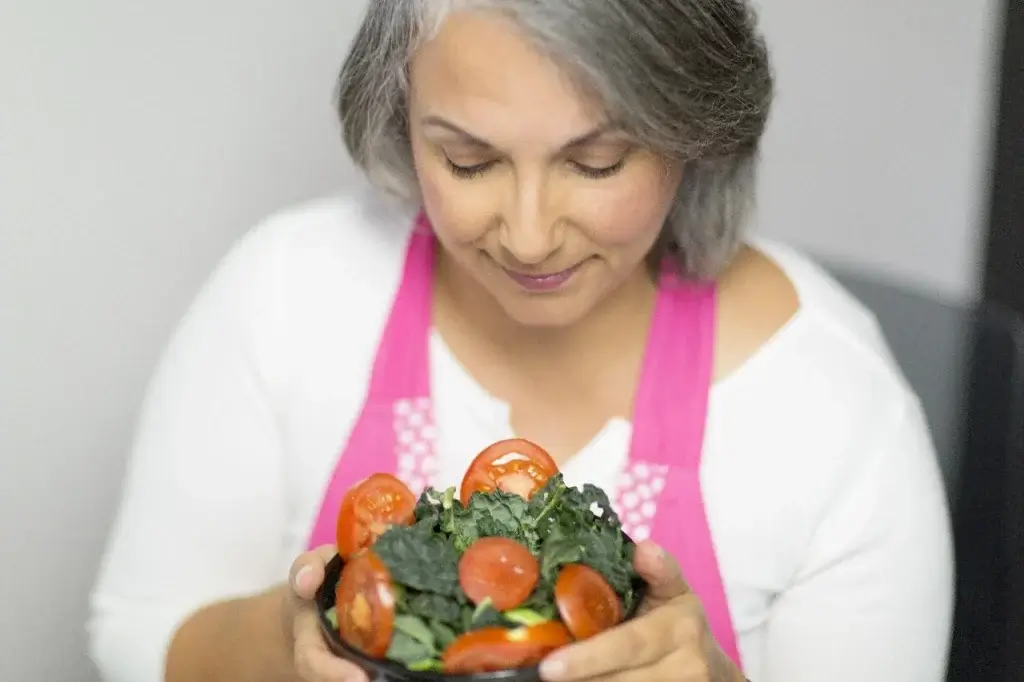

If no one has said this to you yet: you’re not doing anything wrong.
If your jeans feel tighter, if your belly looks and feels different, if the foods that once “worked” suddenly don’t — it’s not a lack of willpower.
It’s physiology.
Menopause shifts the body in ways most of us were never prepared for. Hormones change. Sleep changes. Stress response changes. Metabolism changes. And because of that, the way we nourish ourselves must change, too — not to shrink the body, but to support it.
This is not a crisis.
This is a turning point.
Welcome to your Menopause Diet Era — where food becomes grounding, protective, stabilizing, and deeply supportive of the woman you are becoming.
Often, yes. And here’s why — with no blame attached:
As estrogen declines, your body naturally becomes more inclined to:
Store fat around the abdomen instead of hips/thighs
Lose muscle at a quicker rate
Release more cortisol (your stress hormone)
Crave more comfort foods when sleep disrupts
This isn’t a lack of discipline.
This is your body adapting.
And the good news?
Your metabolism is not broken.
It is responsive and highly retrainable — with the right nourishment, rhythm, and self-support.
Weight changes often happen gradually over several years — late 30s to mid-50s.
But once your hormones settle, and once you shift how you eat and move, your body can absolutely find a new equilibrium.
This is not about getting back to your 25-year-old body.
It’s about feeling:
Strong
Clear-headed
Energized
At ease in your skin
It’s about confidence, not compliance.
When estrogen drops, muscle declines — and muscle is your metabolism’s engine.
More muscle = better sleep, fewer cravings, steadier mood, and a metabolism that works with you.
Don’t measure grams.
Just let protein lead your plate.
You’ll know you’re getting enough when:
You feel satisfied instead of snackish
You don’t crash mid-afternoon
You don’t need sugar to keep going
This is protein doing quiet magic.
Cutting carbs completely makes your hormones panic.
Carbs are:
Brain fuel
Sleep support
Mood stabilizers
Thyroid protectors
The trick is choosing carbs that love you back:
Oats
Millets
Brown rice
Dalia
Lentils
Chickpeas
Sweet potato
Fruit
It’s not the carb.
It’s the blood sugar chaos we are avoiding.
Fat is not indulgent.
Fat is structure, repair, emotional grounding.
Healthy fats:
Keep skin glowing
Reduce inflammation
Support memory + clarity
Steady mood
Include daily:
Avocado
Nuts + seeds
Olive oil
Eggs
Paneer / salmon / flaxseed
Your body is asking for nourishment, not restriction.
Not a rule — a rhythm of safety.
Skipping meals → cortisol rises → body stores fat to protect you.
Regular nourishment tells the body:
You are safe. You can release.
This is how weight shifts without war.
Dehydration often masquerades as:
Irritability
Anxiety
Cravings
Fatigue
Emotional overwhelm
Water is not discipline.
Hydration is self-devotion.
Sip throughout the day — not all at once.
Balanced, grounding, doable.
No calorie counting.
No guilt.
Just nourishment.
Breakfast
Oatmeal + chia + blueberries + cinnamon + protein
OR
Masala oats with veggies + 2 boiled eggs / paneer
Lunch
Lentil-vegetable soup + olive oil + multigrain toast
OR
Dal + sabzi + phulka + lemon + ghee
Snack (if needed)
Roasted nuts or fruit + peanut butter
Dinner
Khichdi + ghee + sautéed greens
OR
Grilled paneer/fish + quinoa + vegetables
Energy Intention:
Eat slowly. Let your body feel safe.
Breakfast
Scrambled eggs + spinach + avocado + whole grain toast
OR
Paneer bhurji + jowar roti
Lunch
Chickpea salad with cucumber, herbs, lemon, olive oil
OR
Chana koshimbir + curd
Snack
Hung curd + honey
OR
Chaach + roasted chana
Dinner
Stir-fry tofu/paneer/chicken + brown rice + broccoli
Energy Intention:
Eat to feel steady, not stimulated.
Breakfast
Smoothie (banana + almond butter + protein + spinach + flax)
OR
Moong chilla + paneer or egg filling
Lunch
Protein wrap + hummus + greens (roti or tortilla works)
Snack
Carrot sticks + hummus
OR
Mixed nuts + herbal tea
Dinner
Sweet potato + sautéed greens + paneer/fish/tofu
Energy Intention:
Nourishment, not discipline.
Breakfast
Hung curd/Greek yogurt + fruit + walnuts
(add protein powder if needed)
Lunch
Millet bowl + roasted vegetables + tahini/peanut drizzle
OR
Bajra/raagi roti + sabzi + curd
Snack
2 squares dark chocolate + herbal tea
Dinner
Clear vegetable soup + boiled eggs / paneer / tofu + salad
Energy Intention:
Soften. Settle. Slow.
Breakfast
Chia pudding + fruit
(any milk works)
Lunch
Quinoa/dalia tabbouleh + chickpeas + lemon + mint
Snack
Pistachios / makhana / fruit
Dinner
Grilled paneer/chicken/tofu + roasted carrots + sautéed spinach
Energy Intention:
Close the day gently.
Weight loss now is not about shrinking yourself.
It’s about learning to support a body in transition.
Regulating blood sugar
Protecting muscle
Calming cortisol
Prioritizing sleep
Honoring your emotional landscape
When you move and eat to feel powerful, not smaller — everything shifts:
Your appetite calms
Your sleep deepens
Your confidence rises
This is not a fight.
This is a return to yourself.
Your body is not the enemy.
Your body is asking for a new kind of care — the kind that honors the woman you are now.
Your body isn’t against you — it’s protecting you.
When estrogen declines, the body shifts into “preserve energy” mode:
It stores more fat (especially around the belly)
It holds onto calories more efficiently
It becomes more sensitive to stress
This isn’t sabotage.
It’s your biology adjusting to a new hormonal reality.
When you nourish steadily (instead of restricting), your body stops feeling threatened.
That’s when weight becomes easier to release.
Because your body is not the same body.
Your hormones, muscle mass, recovery speed, sleep depth, and stress hormones have all shifted.
What worked at 25 or 35 was based on:
Higher estrogen
Faster muscle repair
A more flexible metabolism
Now, success comes from:
Protein-first meals
Slow, stable carbs
Resistance training
Gentle nervous-system care
Your strategy isn’t failing — your season changed.
Your approach simply needs to evolve with it.
No — common does not mean destiny.
Belly fat is a symptom of:
Low muscle mass
Blood sugar swings
High cortisol
Poor sleep quality
When these four shift — even slightly — your waistline shifts too.
You don’t have to overexercise or starve yourself.
You just have to create safety and steadiness inside the body.
Belly fat is often the body saying:
“I don’t feel safe yet.”
Our job is to teach it safety again.
Absolutely not.
Menopause nutrition is about sequence, not sacrifice.
Example:
Eat protein + healthy fat before carbs or sweets.
This reduces blood sugar spikes → cravings quiet down → the body stays calm.
You can still enjoy:
Rice
Rotis
Pulao
Pasta
Dessert
The key is:
Balance > elimination.
Regulation > restriction.
Your life should feel lived, not monitored.
Look for body signals, not numbers:
You feel fuller between meals
You snack less automatically
Sleep becomes deeper or more consistent
Digestion feels smoother
Your mood feels steadier
You feel stronger in your body
Clothes begin to feel more comfortable
The scale is often the last thing to change — and that’s okay.
The internal shifts are the real transformation.
The weight follows the calm.



 ×
×

